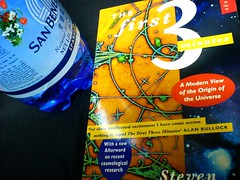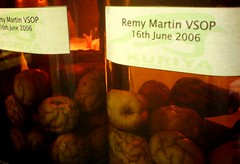Science As Dictatorship?
My nan used to enjoy a nip of brandy and a bit of Readers' Digest-if before bed, heart-warming stories for a peaceful night's rest. I know of others who turn pages of the Bible for their soporific nightcap. Reckoning the Scriptures far too mind-swirling, my preferences used to run to popular science rags: New Scientist, Popular Science, Nature, Scientific American, American Scientist, Technology Review, and Astronomy, for a nice tuck-in. (Flips on urban conjecture and architectural speculation make lovely graphic-rich bedtime stories as well, but more another time.)
Pop science mags are what a dish of warm milk might be to a cat (though probably not Schrodinger's): yummy, lappable, wholesome, comforting.
They are a celebration of the richness of life, the wealth of the known universe (whose boundaries keep expanding deliciously), the magnificence of the cosmos, the spot of light on the mysteries of the deep dark sea, the beauty of the quantum and infinity in a grain of sand, the spawning sprawling fields of astrobiology and nanotechnology.
They comfort their readers with the implication that life can only get better with the advance of science: breakthroughs in cures for cancer and Alzheimers', technological progress that'll make life cushier (and cars flashier and spiffier), conquering the wider universe for the benefit of the human race (especially the space tourism industry), achieving washboard stomachs in 12 easy steps in 2 weeks (just in time for beach volleyball in the summer).
They are lovely saucers of Jersey cream that purr,"Lap it up, lads! We humans are at the helm!" Given enough time, enough manpower, enough research dollars, enough perseverance, enough studies presented at conferences, we can understand most things and Stephen Hawking will have his Theory of Everything and his mobility (and I don't mean a bit of a flail-about in zero-G with nurses in attendance). With this greater knowledge we will be able to steer our own destiny: we will mod our genes to re-wire human beings, we will eliminate the causes of diseases, we will know which sensory/experiential buttons to push to obtain desired social behaviour; with GM crops we will eliminate poverty, with united effort and many conventions we will stop hurting the environment; we will ensure the survival of our life on earth by shooting down asteroids that threaten our extinction (remember them dinosaurs!); our children will inherit a cleaner world; we will know how to live longer by moderating our eating; we will harness singularities and master time; we will tame our inner life with psychology; and perhaps (although few expressly promise such a thing) one day, we may never have to die.
Like many fairytales however, one suspects that the conclusion to the story isn't quite the happily-ever-after we would like.
Aside from the slight-problem-of-technology-in-corrupt-hands dystopias prophesied by Aldous Huxley, George Orwell et al and practical concerns about regulating inter-stellar warp-drive traffic, it is the fundamental validity of science itself as final arbiter of objective truth that is of great concern.
We have come to assume that anything under the auspices of science must surely be a true explanation of reality. (Wherefrom emerge such statements as:"If in fact it is true - and I've asked doctors this - that you are genetically born a homosexual, because that's the nature of the genetic random transmission of genes, you can't help it.")
If as T.S. Eliot's Becket says, "humankind cannot bear very much reality", what is the reality that humans find intolerable? The bright illuminating light of science on the world that causes outdated superstitious religions to find solace by sticking their head in the sand? Or our fearful lack of understanding of and control over the sheer vastness and complexity of the universe that drives us to the blind worship of science?
How much have we mindlessly bought into the spin about the Enlightenment!, the Dawn of Knowledge!, the Age of Reason!, the Autonomy of Humankind!, the Epitome of True Knowledge!, the Eschatology of the Test-tube!?
The quarrel is not with science per se which has proven fairly decent for air-conditioning and cross-continent Skype-ing with loved ones, nor is it about taking the whip to the much-flogged horse of dark-minded Christianity fighting a desperate rear-guard battle against the blonde-haired blue-eyed juggernaut of Reason, nor is it some Keatian lament (according to popular (mis)interpretations of Lamia) about Newton unweaving the rainbow and destroying beauty in the universe.
It is that what is mere theory and hypothesis, mere world-picture and metanarrative myth, is taken as absolute truth. It is that its proponents tout it the sole source of rationality (read: reality) in this otherwise mindless world. It is about the arrogance of science worshippers, daydreaming of omniscience, presuming to extend the rule of Science solely and absolutely over all areas of life; it is about the tyrannical reductivism of scientific methods of thought upon unsuitable areas such as ultimate meaning; it is that we let ourselves, without so much as a whimper, be led by the nose and governed and have our lives mapped by something as unworthy as this.
PS:
Pop science doesgive you useful excuses tell you useful stuff, like how mixing lovely sweet red strawberries with your choice of leftover alcohol gives you a potent antioxidant slush. And antioxidants, as everyone knows, not only mod your insides to make you smell better to your cat, they also endow you with the ability to watch an entire episode (a whole episode! beginning to end!) of America's Next Top Model. Without getting hernia.
PPS: Clearly, ethanol does shrink brains.
PPPS:
Pop science mags are what a dish of warm milk might be to a cat (though probably not Schrodinger's): yummy, lappable, wholesome, comforting.
They are a celebration of the richness of life, the wealth of the known universe (whose boundaries keep expanding deliciously), the magnificence of the cosmos, the spot of light on the mysteries of the deep dark sea, the beauty of the quantum and infinity in a grain of sand, the spawning sprawling fields of astrobiology and nanotechnology.
They comfort their readers with the implication that life can only get better with the advance of science: breakthroughs in cures for cancer and Alzheimers', technological progress that'll make life cushier (and cars flashier and spiffier), conquering the wider universe for the benefit of the human race (especially the space tourism industry), achieving washboard stomachs in 12 easy steps in 2 weeks (just in time for beach volleyball in the summer).
They are lovely saucers of Jersey cream that purr,"Lap it up, lads! We humans are at the helm!" Given enough time, enough manpower, enough research dollars, enough perseverance, enough studies presented at conferences, we can understand most things and Stephen Hawking will have his Theory of Everything and his mobility (and I don't mean a bit of a flail-about in zero-G with nurses in attendance). With this greater knowledge we will be able to steer our own destiny: we will mod our genes to re-wire human beings, we will eliminate the causes of diseases, we will know which sensory/experiential buttons to push to obtain desired social behaviour; with GM crops we will eliminate poverty, with united effort and many conventions we will stop hurting the environment; we will ensure the survival of our life on earth by shooting down asteroids that threaten our extinction (remember them dinosaurs!); our children will inherit a cleaner world; we will know how to live longer by moderating our eating; we will harness singularities and master time; we will tame our inner life with psychology; and perhaps (although few expressly promise such a thing) one day, we may never have to die.
Like many fairytales however, one suspects that the conclusion to the story isn't quite the happily-ever-after we would like.
Aside from the slight-problem-of-technology-in-corrupt-hands dystopias prophesied by Aldous Huxley, George Orwell et al and practical concerns about regulating inter-stellar warp-drive traffic, it is the fundamental validity of science itself as final arbiter of objective truth that is of great concern.
We have come to assume that anything under the auspices of science must surely be a true explanation of reality. (Wherefrom emerge such statements as:"If in fact it is true - and I've asked doctors this - that you are genetically born a homosexual, because that's the nature of the genetic random transmission of genes, you can't help it.")
If as T.S. Eliot's Becket says, "humankind cannot bear very much reality", what is the reality that humans find intolerable? The bright illuminating light of science on the world that causes outdated superstitious religions to find solace by sticking their head in the sand? Or our fearful lack of understanding of and control over the sheer vastness and complexity of the universe that drives us to the blind worship of science?
How much have we mindlessly bought into the spin about the Enlightenment!, the Dawn of Knowledge!, the Age of Reason!, the Autonomy of Humankind!, the Epitome of True Knowledge!, the Eschatology of the Test-tube!?
- How much are scientific theories exact statements of fact and how much are they short stories about existing facts, romantic explanations of natural phenomena? How blinkered in explication are their propositions, say, of the wave-particle duality of light?
- What is the basis, for example, for the zeitgeist flavour of this decade: determinism? How valid is the fatalism that who we are has already been determined by nature and nurture, our genes and our early environment?
- Observer effect and Heisenberg uncertainty principle aside, how objective are researchers? How much are their interpretations influenced by existing presuppositions and political agenda?
- How far the purported omnicompetence of science? How valid the excursions of science to areas such as value, morality and meaning? Does science really undermine the theories of value, morality and meaning? If science cannot measure value, morality or meaning, do they not exist? If ears do not detect colour, do colours not exist?
The quarrel is not with science per se which has proven fairly decent for air-conditioning and cross-continent Skype-ing with loved ones, nor is it about taking the whip to the much-flogged horse of dark-minded Christianity fighting a desperate rear-guard battle against the blonde-haired blue-eyed juggernaut of Reason, nor is it some Keatian lament (according to popular (mis)interpretations of Lamia) about Newton unweaving the rainbow and destroying beauty in the universe.
It is that what is mere theory and hypothesis, mere world-picture and metanarrative myth, is taken as absolute truth. It is that its proponents tout it the sole source of rationality (read: reality) in this otherwise mindless world. It is about the arrogance of science worshippers, daydreaming of omniscience, presuming to extend the rule of Science solely and absolutely over all areas of life; it is about the tyrannical reductivism of scientific methods of thought upon unsuitable areas such as ultimate meaning; it is that we let ourselves, without so much as a whimper, be led by the nose and governed and have our lives mapped by something as unworthy as this.
PS:
Pop science does
PPS: Clearly, ethanol does shrink brains.
PPPS:
...the wrath of God is revealed from heaven against all ungodliness and unrighteousness of men, who by their unrighteousness suppress the truth. For what can be known about God is plain to them, because God has shown it to them. For his invisible attributes, namely, his eternal power and divine nature, have been clearly perceived, ever since the creation of the world, in the things that have been made. So they are without excuse. For although they knew God, they did not honour him as God or give thanks to him, but they became futile in their thinking, and their foolish hearts were darkened. Claiming to be wise, they became fools, and exchanged the glory of the immortal God for images resembling mortal man and birds and animals and reptiles. (Romans 1:18-23)
Labels: Science-ish Schtick













3 Comments:
i agree with what some one says of dawkins:Interestingly, it is the sheer blindness of Dawkins own thinking that beggars belief, rather than the poorly charicatured views of Christians that he attempts to explain and challenge. While he waxes lyrical about the imporance of evidence based thinking, good scholarship and critical thinking skills, he never quite manages to be convincing, because he never holds his magnifying glass over his own views. Tellingly, he is the best example that we have of someone who will not respond to evidence and scholarship, who will not engage properly with his critics. Richard Dawkins is his own enemy. He is the strongest example of what he loves to hate. The mirage of unthinking evangelical Christians, are only projections from his own mind. He himself, projects them in just the same way that he argues that they project their religious beliefs. This might sound silly, but he's actually very serious. So serious that its probably true to say that if religion is a strict adherence to a system of transformation, then Richard Dawkins is the most religious man in the World, who also happens to be his very own nemesis.
Bertrand Russell, the famous atheist philosopher, was once asked what he would say to God if after dying he found himself standing in judgement before God and asked to give an account of his life. Bertrand quipped that he would say, "I should reproach him for not giving us enough evidence."
The quote from Romans doesn't allow this excuse to be used.
Shadow:
If as T.S. Eliot's Becket says, "humankind cannot bear very much reality", what is the reality that humans find intolerable? The bright light of science on the world that causes outdated superstitious religions to find solace by sticking their head in the sand? Or our fearful lack of understanding of and control over the sheer vastness and complexity of the universe that drives us to the blind worship of science?
How much have we mindlessly bought into the spin about the Enlightenment!, the Dawn of Knowledge!, the Age of Reason!, the Autonomy of Humankind!, the Epitome of True Knowledge!, the Eschatology of the Test-tube!?
How much are scientific theories exact statements of fact and how much are they short stories about existing facts, romantic explanations of natural phenomena?
How blinkered in explication are their propositions, say, of the wave-particle duality of light?
What is the basis, for example, for the zeitgeist flavour of this decade: determinism?
How valid is the fatalism that who we are has already been determined by nature and nurture, our genes and our early environment?Observer effect and Heisenberg uncertainty principle aside, how objective are researchers? How much are their interpretations influenced by existing presuppositions and political agenda?
How far the purported omnicompetence of science? How valid the excursions of science to areas such as value, morality and meaning?
Does science really undermine the theories of value, morality and meaning? If science cannot measure value, morality or meaning, do they not exist? If ears do not detect colour, do colours not exist?
All extremely reasonble and apposite questions, I say, Shadow (although in addition to the wave-particle duality of light you could have added matter as well).
And then suppose that we are just waiting for the Doors of Perception to be clensed before we can build the New Jerusalem where 'all shall be well and all manner of thing shall be well when the tongues of the flame are infolded and the fire and the rose are one.'
But then suppose also that it's the dictatorship of science that's still in the way people seeing everything as infinite.
Post a Comment
Subscribe to Post Comments [Atom]
<< Home